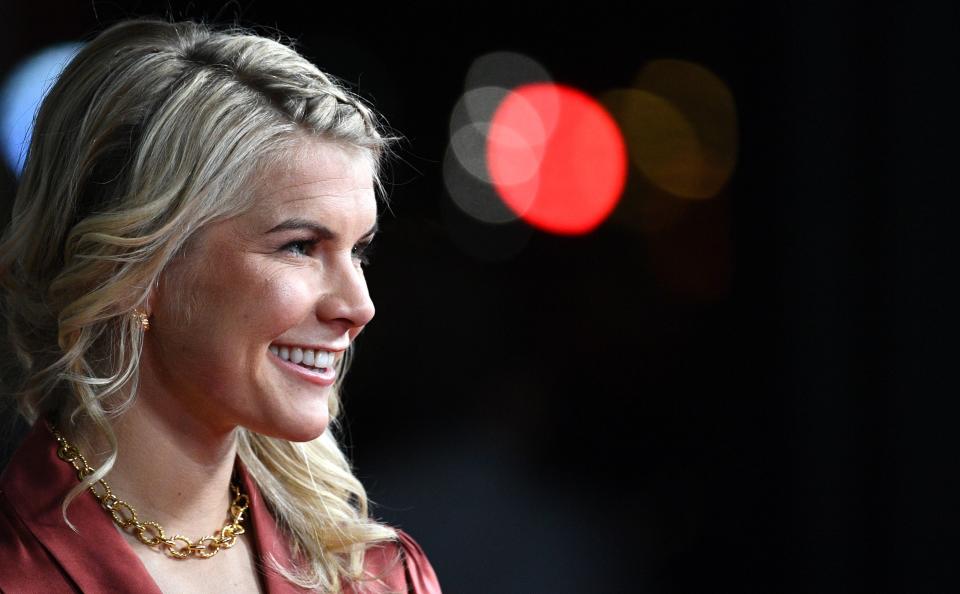Ada Hegerberg's Nike deal is just as much about agency, equal pay platform as it is money
Ada Hegerberg broke into mainstream soccer consciousness when she won the inaugural Ballon d'Or Féminin in December 2018. At the end of her moving acceptance, she delivered a parting piece of advice.
“I would like to end this speech with some words to young girls all over the world: Please, believe in yourselves,” she said.
There’s nothing like living by example. Nike announced Monday it was signing the Norwegian soccer star to a long-term endorsement deal. Hegerberg had been with Puma since 2014, when she was only 18, and will now reportedly make around $1 million per year for “at least” 10 years. It’s still not in the ballpark of money given to male players of her caliber, but it’s approaching the parkway at least.
Her signing is less about the money, though, and more about her strong sense of agency and the visibility the 24-year-old will gain from a company committed to women’s sports. In years past, women took what endorsement deals they were given because they had to. Now, with a deep belief in themselves, they look around for the best deal that aligns with their own professional and personal goals.
It’s clear that Hegerberg’s goal is growing the sport. This is, after all, a woman who sat out the 2019 World Cup to protest how women’s soccer is treated in her native Norway.
“For me personally, this is a groundbreaking step in my career,” Hegerberg said during a Zoom interview on Monday, via Forbes. “I feel like Nike has inspired millions of people in sports and they’re kind of the game changer in sports when it comes to lifting the women in sports as well and setting the bar, you could say. ... And hopefully this partnership can write history again back on the pitch when I’m back again.”

The athletic apparel giant put its first cleat print down in women’s soccer in late 1992 when Joe Elsmore, a young Nike employee with a side gig as a referee, met with Mia Hamm. Nike officially signed her in 1994, when she was finished at North Carolina, and offered enough to cover all of her expenses. The high-profile roster has only grown since, with Abby Wambach, Alex Morgan, Carli Lloyd, Megan Rapinoe and Mallory Pugh among its ranks.
And that commitment to female athletes goes beyond soccer. Nike counts WNBA champions Elena Delle Donne, Diana Taurasi, Breanna Stewart and Sue Bird among its growing women’s basketball cohort. And it landed Sabrina Ionescu, who’s already a superstar with an education in brands taking a stand for social justice to match.
These are stars whose talent earned them Nike deals, but in turn Nike’s marketing earned them visibility, increased stardom and a platform. Hegerberg didn’t get as much of that with Puma.
For precedent, there’s Serena Williams, who jumped from Puma — a brand with tennis success — to Nike in 2003. That partnership contributed to a vast empire that includes fashion, women’s empowerment ads and investments in mostly women- and minority-owned companies. That’s a good way to tip the scales, and now Hegerberg has set herself up to do the same as she continues her push for gender equality in her sport.
Hegerberg is one of the best soccer players in the world, with four consecutive Women’s Champions League titles and six consecutive French Division I Feminine titles since joining Lyon in 2014. She is the Champions League’s all-time leading scorer with 53 goals, a total that would rank in the top eight of the men’s record books. And she will go down in history as the first woman to win a Ballon d’Or, even sidestepping blatant sexism in the minutes before accepting the trophy.
Her most immediate task is returning from a ruptured ACL suffered in January when play resumes after the COVID-19 crisis. Once she returns to form, she told FIFA.com she’d like to take up the torch from Rapinoe and Marta to further develop and support women’s soccer.
Nike gives her a better chance of doing that, even if its support of women hasn’t always been perfect. Puma represented a good starting point for Hegerberg as a teenage sensation. But its women-specific strategy is too new and too far behind where Hegerberg is right now.
That’s what Hegerberg’s “Just Did It” signing with Nike truly signifies. When the opportunity came to stake her own future, and that of millions of girls to follow, she took her shot. As usual, she scored.
More from Yahoo Sports:

 Yahoo Sport
Yahoo Sport 






































